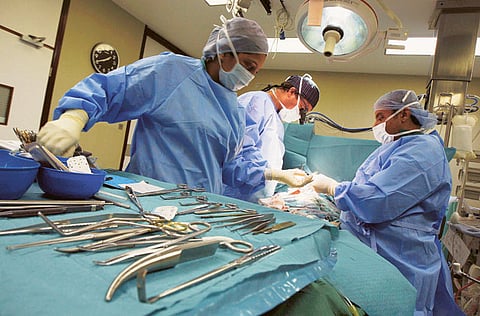Son donates part of his liver to save mother
Al Hadi’s selfless act brings focus on dearth of organ donors in Oman

Muscat: “I will do anything for my mother. I consider myself lucky that I could do this for her,” said Ahmad Al Hadi, a 39-year-old Omani who recently donated part of his liver to save his mother’s life.
Al Hadi, a resident of Amerat province of Muscat governorate, donated 64 per cent of his liver to his mother in a landmark 12-hour liver transplant surgery conducted for the first time last week at the Royal Hospital in Oman’s capital Muscat.
While he was discharged from the hospital on Thursday, his mother is still under observation but reported to be stable, according to the Royal Hospital officials.
Oman in 2016 became the latest Muslim country to allow organ donations in a move that was hailed as necessary to address the chronic shortage of organs in the country.
Al Hadi, a father of five children, told Gulf News that this ‘saga’ began when his mother was diagnosed with a tumour in her liver earlier this year.
“Doctors at the Royal Hospital told me that her only option was liver transplant. The medical tests indicated that I was a perfect match for donation. I didn’t even hesitate for a moment to decide. She means the world to me and I am delighted I could help,” he said.
Al Hadi was also inspired that every day across the world donors save lives and turn loss into hope. He was also confident about the efficiency of the medical staff at the hospital.
Al Hadi first heard of organ donation some years ago. So when the Ministry of Health launched the organ donor card for the first time for brain-dead patients in 2016 he was impressed.
This move he believes can save many lives as many recipients in the country need organs, including kidneys, heart, lungs, eyes and pancreas.
Al Hadi hopes his selfless act will encourage others to consider becoming live donors.
“I have done it and I want others to know that they too can save someone’s life. By being a donor you are giving the gift of life to someone. It’s an heroic act,” he continued.
Al Hadi’s mother will be discharged from the hospital next week. “I can’t wait to see my mother back home and in better health condition,” he further said.
Al Hadi urges people who need organ transplant not to travel outside the country and fall into the hands of unqualified quacks in the black market.
Many Omanis desperate for organ transplants have been travelling outside the country to get transplant done in the black market in Pakistan, India, Egypt and Thailand due to the shortage of the organs in the country.
A growing number of Omanis are opting to become organ donors since the launch of a landmark organ donation program for brain-dead patients in 2016. More than 1,000 Omanis, many of whom are medics, have signed up to donate their organs after their death, according to figures provided by the capital’s Royal Hospital.
Oman in March, 2016, became the latest Muslim country to allow organ donations in a program that was hailed as necessary to address the chronic shortage of organs in the country. Oman faces shortages in organ donors, including kidneys, hearts, lungs, eyes and pancreas.
Organ donation is rare in Muslim countries as the body is considered sacred in Islam
In 2014, Oman’s Grand Mufti Shaikh Ahmad Al Khalili passed a fatwa, a religious edict, permitting donation of organs once brain-dead under “special” conditions.
Before the fatwa, those in need of transplants would wait for imported organs to arrive.
The ministry has launched extensive campaigns nationwide to spread awareness on the importance of organ donation.
Applicants can visit the Royal Hospital to fill out the form or call the hospital and provide their details.
Eight lives can potentially be saved if one person donates all of his or her organs, Health Minister Ahmad Al Saeed had said earlier.
“Because of the limited kidney donors, we are encouraging people to donate, in accordance with religious, legal and medical practices,” he said.
Forty-six per cent of kidney failure in the country is caused by diabetes, followed by high blood pressure, according to the minister.
Sign up for the Daily Briefing
Get the latest news and updates straight to your inbox



